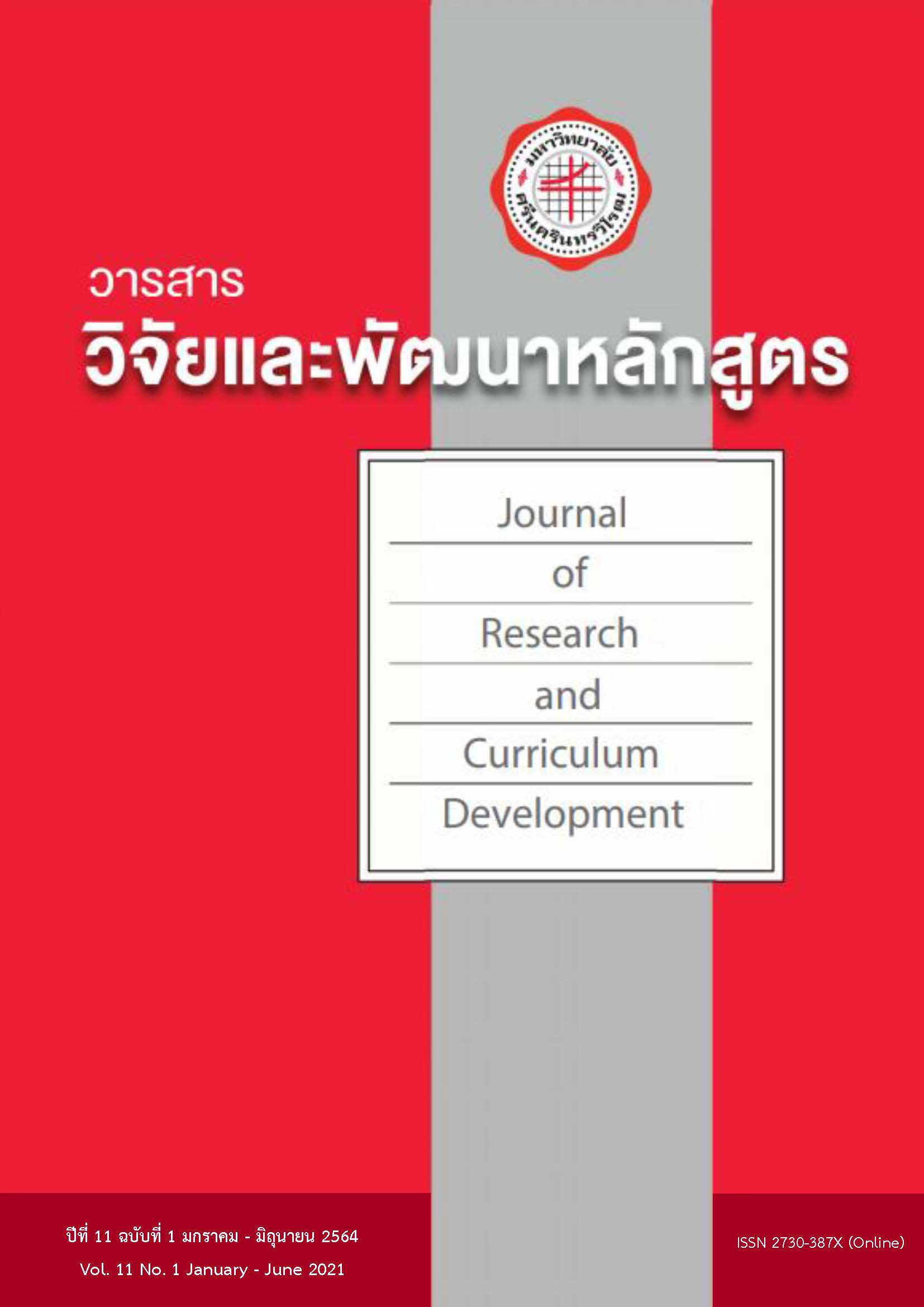การประเมินการจัดกิจกรรมพัฒนาวิชาชีพแบบชุมชนแห่งการเรียนรู้ทางวิชาชีพของเครือข่ายที่ได้รับการสนับสนุนจากสำนักงานเลขาธิการคุรุสภา
Keywords:
KSP-CPR Model, Evaluation Research, Profession Development Activities, Professional Learning Community (PLC), KhurusaphaAbstract
The Teachers’ Council of Thailand (Khurusapha), which has more than 101 networks of Thai teachers and teaching personnel, conducted an evaluation of professional development activities in 2019 via Professional Learning Community (PLC). The objective is to assess activities organized to enhance teaching profession through PLC across Thailand. Researchers set KSP-CPR as evaluation framework comprises context (C), process (P) and result (R). Fieldwork was used as research methodology for data collection which consisted of observing classroom and engaging in conversation with teachers who received funding as well as conducting surveys, knowledge evaluation and satisfactory assessment. Focus group consisted of 357 teachers. TrainFix system and Google Form were utilized in collecting quantitative data while qualitative data was collected from university representative in the fieldwork who performed as academic mentor to teachers in the network. The research result can be summarized as follows;
- The result of budgetary evaluation shows that the network was capable of sufficiently managing the given fund. All facilities were well-prepared, suitable and efficient. In term of participation, the network successfully encouraged participation of teachers from all ranking. As a result, teachers’ network within the target area is strengthened and the members expressed positive perspective towards the activities. Also, members of the network demonstrated satisfying level of knowledge and understanding in PLC. The average scoring was 11.58 (out of 15) which ranks as high level. In fact, the research depicts that majority of teachers’ performance is at high level which accounts for 52.69 percent of the total target group. Secondly, 31.79 percent denote medium level of understanding and 15.53 percent represent low level of understanding. In term of schools’ policy, the research reflects that most of the school executives attach importance to constructively implement professional development and PLC activities at policy level.
- 2. The result of process evaluation shows that the network comprehensively implemented all steps and processes of 5 components and 3 cycles under PLC framework.
- Upon conducting result analysis in term of individual development, teachers were receptive of the activities and engaged interactively to exchange views among each other. They were able to provide recommendation to their team members. There were also evidences of teachers applying the advises from their team members to classroom activities or experimenting new activities learned from the team members in their own classroom.
As per local community engagement, parents and the community are well-informed of the activities and depict confidence in the schools’ abilities to provide quality education. Moreover, local organization become more active in supporting schools’ activities.
Satisfactory assessment shows that the network members are pleased with the coaches, mentors, the monitoring, follow up and evaluation process of the university. The overall evaluation denotes high level of satisfaction. ( = 4.47, S.D. = 0.66)
References
จุฑามาศ คำผัด. (2560). ความพึงพอใจของครูต่อการบริหารสถานศึกษาแบบ PLC ของผู้บริหารสถานศึกษาในอำเภอแม่แจ่ม สังกัดสำนักเขตพื้นที่การศึกษาประถมศึกษาเชียงใหม่ เขต 6 (วิทยานิพนธ์ปริญญาศึกษาศาสตรมหาบัณฑิต). กรุงเทพฯ: มหาวิทยาลัยรามคำแหง.
วาสนา มะณีเรือง. (2559). รูปแบบการพัฒนาครูเก่งครูดีของสถานศึกษาขั้นพื้นฐาน. วารสารสันติศึกษาปริทรรศน์ มจร., 30(2), หน้า 260-278.
วรพงษ์ เถาว์ชาลี. (2557). ประสิทธิภาพการบริหารสถานศึกษาที่สัมพันธ์กับการเป็นโรงเรียนมาตรฐานสากลของโรงเรียนมัธยมศึกษาในภาคตะวันออกเฉียงเหนือ (วิทยานิพนธ์ปริญญาศึกษาศาสตรมหาบัณฑิต). นครปฐม: มหาวิทยาลัยศิลปากร.
ปารณทัตต์ แสนวิเศษ. (2555). การมีส่วนร่วมของชุมชนในการจัดการศึกษาขั้นพื้นฐานของโรงเรียนประถมศึกษา : การสร้างทฤษฎีจากฐานราก. วารสารบริหารการศึกษา, 9(16). 69-82.
สมศักดิ์ จี้เพชร. (2562). การพัฒนาคุณภาพครูโดยการนิเทศแบบสอนแนะและการเป็นพี่เลี้ยง. วารสารวิชาการ บัณฑิตวิทยาลัย มหาวิทยาลัยสวนดุสิต, 15(2). หน้า 165-184.
สุวิมล มธุรส, กิตติ รัตนราษี และอนันต์ อุปสอด. (2562). การศึกษาไทย 4.0 ในบริบทของผู้บริหารสถานศึกษา. วารสารวิทยาลัยสงฆ์ลำปาง, 8(2). 266-278.
สำนักงานเลขาธิการคุรุสภา. (2561). กรอบสมรรถนะครูเอเชียตะวันออกเฉียงใต้ (ซี-ทีซีเอฟ). กรุงเทพฯ: ออนป้า.
_______. (2562). ประกาศสำนักงานเลขาธิการคุรุสภา เรื่อง การเสนอโครงการเพื่อขอรับเงินอุดหนุนกิจกรรมพัฒนาวิชาชีพแบบชุมชนแห่งการเรียนรู้ทางวิชาชีพ (Professional Learning Community: PLC) ประจำปี 2562. สืบค้น 29 กรกฎาคม 2562, จาก http://www.ksp.or.th/ksp2018/2019/06/6274/
อรรณพ จีนะวัฒน์. (2559). การบริหารงานบุคคลของสถานศึกษา สังกัดสานักงานส่งเสริม การศึกษานอกระบบและการศึกษาตามอัธยาศัย กรุงเทพมหานคร. นนทบุรี: มหาวิทยาลัยสุโขทัยธรรมาธิราช.
อริยพร คุโรดะ. (2550). การพัฒนาหลักสูตรและการสอนสาขาวิชาศิลปศึกษาระดับบัณฑิตศึกษาในประเทศไทย (วิทยานิพนธ์ปริญญาครุศาสตรดุษฎีบัณฑิต). กรุงเทพฯ: จุฬาลงกรณ์มหาวิทยาลัย.
อัมพร พินะสา. (2559). การเปลี่ยนผ่านการศึกษาไทยในอดีตสู่ทิศทางการบริหารจัดการทางการศึกษายุค 4.0 อย่างยั่งยืน. สืบค้น 18 สิงหาคม 2562, จาก ww.dsdw2016.dsdw.go.th/doc_pr/ndc_2560-2561/PDF/8596s/8596
Andrews, D. and Lewis, Marian. (2002). The experiences of a professional community: teachers developing a new image of themselves and their workplace. Educational Research, 44(3), pp. 237-254.
Krejcie, R. V. & Morgan, D. W. (1970). Determining Sample Size for Research Activities. Educational and Psychological Measurement, 30(3), pp. 607-610.
Merrimack College. (2020). สืบค้น 3 สิงหาคม 2563, จาก https://www.merrimack.edu/
Richard DuFour. (2004). What Is a “Professional Learning Community”. Educational Leadership, 61, pp. 6-11.
Scott, J. (1990). A matter of record: Documentary sources in social research. Polity press: Cambridge.
Senge, P. M. (1990). The Fifth Discipline: The Art and Practice of the Learning. Organization. New York: Doubleday.
Shirley M. Hord. (2009). Professional learning communities. Journal of Staff. Development, 30(1), pp. 40-43.





